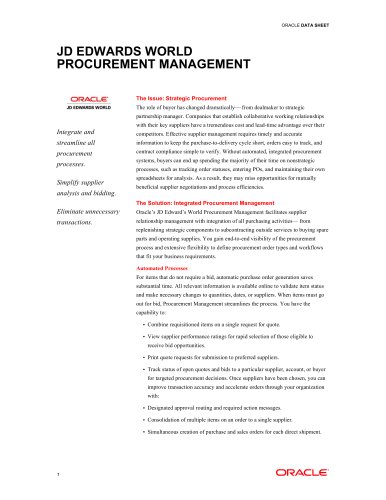
Catalog excerpts
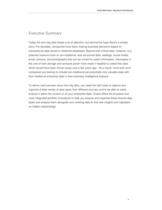
Executive Summary Today the term big data draws a lot of attention, but behind the hype there's a simple story. For decades, companies have been making business decisions based on transactional data stored in relational databases. Beyond that critical data, however, is a potential treasure trove of non-traditional, less structured data: weblogs, social media, email, sensors, and photographs that can be mined for useful information. Decreases in the cost of both storage and compute power have made it feasible to collect this data which would have been thrown away only a few years ago. As a...
Open the catalog to page 3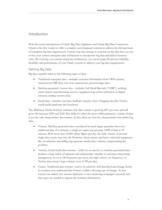
Introduction With the recent introduction of Oracle Big Data Appliance and Oracle Big Data Connectors, Oracle is the first vendor to offer a complete and integrated solution to address the full spectrum of enterprise big data requirements. Oracle’s big data strategy is centered on the idea that you can evolve your current enterprise data architecture to incorporate big data and deliver business value. By evolving your current enterprise architecture, you can leverage the proven reliability, flexibility and performance of your Oracle systems to address your big data requirements. Defining...
Open the catalog to page 4
Value. The economic value of different data varies significantly. Typically there is good information hidden amongst a larger body of non-traditional data; the challenge is identifying what is valuable and then transforming and extracting that data for analysis. To make the most of big data, enterprises must evolve their IT infrastructures to handle the rapid rate of delivery of extreme volumes of data, with varying data types, which can then be integrated with an organization’s other enterprise data to be analyzed. The Importance of Big Data When big data is distilled and analyzed in...
Open the catalog to page 5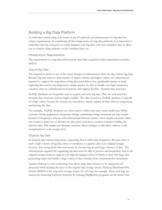
Building a Big Data Platform As with data warehousing, web stores or any IT platform, an infrastructure for big data has unique requirements. In considering all the components of a big data platform, it is important to remember that the end goal is to easily integrate your big data with your enterprise data to allow you to conduct deep analytics on the combined data set. Infrastructure Requirements The requirements in a big data infrastructure span data acquisition, data organization and data analysis. The acquisition phase is one of the major changes in infrastructure from the days before...
Open the catalog to page 6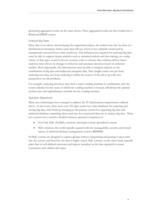
generating aggregated results on the same cluster. These aggregated results are then loaded into a Relational DBMS system. Since data is not always moved during the organization phase, the analysis may also be done in a distributed environment, where some data will stay where it was originally stored and be transparently accessed from a data warehouse. The infrastructure required for analyzing big data must be able to support deeper analytics such as statistical analysis and data mining, on a wider variety of data types stored in diverse systems; scale to extreme data volumes; deliver...
Open the catalog to page 7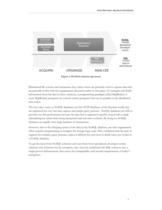
Distributed File Systems Key/Value Stores DBMS (OLTP) ACQUIRE Flexible Specialized Developercentric MapReduce Solutions ETL ORGANIZE Data Warehouse Trusted Secure Administered ANALYZE Figure 1 Divided solution spectrum Distributed file systems and transaction (key-value) stores are primarily used to capture data and are generally in line with the requirements discussed earlier in this paper. To interpret and distill information from the data in these solutions, a programming paradigm called MapReduce is used. MapReduce programs are custom written programs that run in parallel on the...
Open the catalog to page 8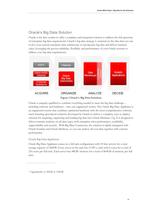
Oracle’s Big Data Solution Oracle is the first vendor to offer a complete and integrated solution to address the full spectrum of enterprise big data requirements. Oracle’s big data strategy is centered on the idea that you can evolve your current enterprise data architecture to incorporate big data and deliver business value, leveraging the proven reliability, flexibility and performance of your Oracle systems to address your big data requirements. Figure 2 Oracle’s Big Data Solutions Oracle is uniquely qualified to combine everything needed to meet the big data challenge – including...
Open the catalog to page 9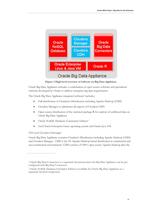
Figure 3 High-level overview of software on Big Data Appliance Oracle Big Data Appliance includes a combination of open source software and specialized software developed by Oracle to address enterprise big data requirements. The Oracle Big Data Appliance integrated software2 includes: Full distribution of Cloudera’s Distribution including Apache Hadoop (CDH) Cloudera Manager to administer all aspects of Cloudera CDH Open source distribution of the statistical package R for analysis of unfiltered data on Oracle Big Data Appliance Oracle NoSQL Database Community Edition3 And Oracle...
Open the catalog to page 10
comprehensive set of open source software components needed to use Hadoop. Cloudera Manager is an end-to-end management application for CDH. Cloudera Manager gives a clusterwide, real-time view of nodes and services running; provides a single, central place to enact configuration changes across the cluster; and incorporates a full range of reporting and diagnostic tools to help optimize cluster performance and utilization. Oracle Big Data Connectors Where Oracle Big Data Appliance makes it easy for organizations to acquire and organize new types of data, Oracle Big Data Connectors enables...
Open the catalog to page 11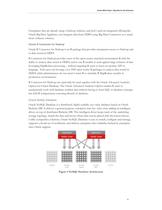
Enterprises that are already using a Hadoop solution, and don’t need an integrated offering like Oracle Big Data Appliance, can integrate data from HDFS using Big Data Connectors as a standalone software solution. Oracle R Connector for Hadoop is an R package that provides transparent access to Hadoop and to data stored in HDFS. R Connector for Hadoop provides users of the open-source statistical environment R with the ability to analyze data stored in HDFS, and to run R models at scale against large volumes of data leveraging MapReduce processing – without requiring R users to learn yet...
Open the catalog to page 12All Oracle catalogs and technical brochures
-
Oracle Analytics
4 Pages
-
STORAGETEK SL150
5 Pages
-
Oracle Server X7-8
6 Pages
-
Oracle Server X7-2
6 Pages
-
Oracle’s SPARC T7 and M7
6 Pages
-
Oracle Solaris 11
3 Pages
-
sparc-t5-2-ds-1922871
6 Pages
-
ds-timesten-imdb-129255
3 Pages
-
osb
2 Pages
-
oracle-database-editions-wp-12c
19 Pages
-
MySQL
4 Pages
-
ORACLE SOLARIS 10
5 Pages
-
Oracle Linux (White Paper)
23 Pages
-
ORACLE SOLARIS 11.1
4 Pages
-
Oracle Fusion Middleware
556 Pages
-
pillar-axiom-600
6 Pages
-
036083
4 Pages
-
DB
2 Pages
-
erp-cloud
7 Pages
-
netra-blade-x3-2b
4 Pages
-
etra-sparc-t4-2-ds
4 Pages
-
netra-server-x3-2-ds
5 Pages
-
m-seriesarchitecture
64 Pages
-
sparc-t4-4
4 Pages
-
dynamic-tracing
2 Pages
-
solaris-zfs
3 Pages
-
solaris-10
5 Pages
-
Oracle WebCenter
8 Pages
-
Sun Server X2-8
5 Pages
-
Sun Server X2-4
5 Pages
-
Sun Server X3-2L
5 Pages
-
Sun Server X3-2
5 Pages
-
sun-fire-x2270-
4 Pages
-
servers-storage
19 Pages
-
sparc-supercluster
6 Pages
-
public-sparc-roadmap
4 Pages
-
hardware-brochure
8 Pages
-
berkeley-db-xml
2 Pages
-
berkeley-db
2 Pages
-
berkeley-db
2 Pages
-
exadata
2 Pages
-
database-firewall
2 Pages
-
advanced-security
2 Pages
-
034782
5 Pages
-
java-tech-for-embedded
2 Pages
-
application-server
18 Pages
-
em12c-executive
2 Pages
-
dms-11g
4 Pages
-
oracle_DATA.pdf
22 Pages
Archived catalogs
-
Sun Network 10GbE Switch 72p
4 Pages
-
Sun Storage 2500-M2 Array
3 Pages
-
Sun Blade 6000
5 Pages
-
Sun Blade X6270 M2
4 Pages
-
Oracle Learning Management
5 Pages
-
Oracle Human Resources
5 Pages




































































